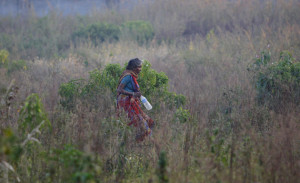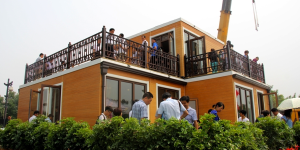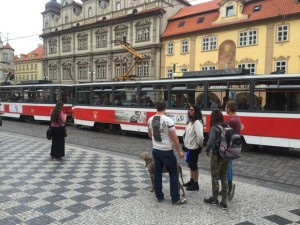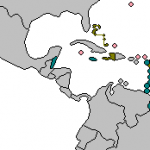Reinier de Graaf ~ The Smart City Blinds Us To The Possibility Of Political Action
 Urbanisation was supposed to be the world’s quick ticket to prosperity. The average urban dweller (on paper) represents five times the economy of the rural dweller. If a rural nation becomes urban in the space of a decade, its economy – at least in theory – doubles every two years. That statistic, however, can hardly conceal the more grim reality. Over the last few decades we have seen that the spectacular growth of cities by no means entails greater and more widely shared prosperity.
Urbanisation was supposed to be the world’s quick ticket to prosperity. The average urban dweller (on paper) represents five times the economy of the rural dweller. If a rural nation becomes urban in the space of a decade, its economy – at least in theory – doubles every two years. That statistic, however, can hardly conceal the more grim reality. Over the last few decades we have seen that the spectacular growth of cities by no means entails greater and more widely shared prosperity.
What we refer to as “megacities” are mostly cities with the common feature that their development is outpaced by their growth. A lot of these cities exist in a state of almost permanent crisis, where “urbanisation” (literally: the step towards the urbane) has come to signify the exact opposite. In the absence of even the most basic infrastructure and provisions, many of its inhabitants find a decent urban life beyond their reach.
Read more: http://www.dezeen.com/reinier-de-graaf
Barcelona, Medellín And The Right To Housing
Barcelona and Medellín are miles away from each other. You might think there is little in common between them. But the truth is there are plenty of similitudes; they are both cities of comparable sizes that have been cooperating mutually for a long time and have been acknowledged for promoting an inclusive urban planning strategy that puts public spaces at the heart of social redistribution.
Nonetheless, both cities suffer from the same problem of guaranteeing the right to housing. And this is exactly what is presented in the exhibition called Piso Piloto, or Pilot Project, hosted at the same time in both cities: Barcelona and Medellín.
Barcelona City Council and the Mayor’s office of Medellín, in association with The Centre de Cultura Contemporània de Barcelona (CCCB) and the Museo de Antioquia launched the exhibition last month, which will be displayed until October 2015 in both cities.
Read more: http://www.sustainablecitiescollective.com/barcelona-medell-n-and-right-housing?
Joseph Erbentraut ~ Groups Bring 10,000 Affordable Toilets To Rural India So Women Can Relieve Themselves Safely

An Indian woman walks in a field after relieving herself in the open, on World Toilet Day on the outskirts of Jammu, India, Wednesday, Nov. 19, 2014. U.N. figures show of India’s 1.2 billion people, 665 million, mostly those in the countryside, don’t have access to a private toilet or latrine, something taken for granted in developed nations. Some villages have public bathrooms, but many women avoid using them because they are usually in a state of disrepair and because men often hang around and harass the women. (AP Photo/Channi Anand)
For many women in poor, rural parts of the world, a lack of access to a private toilet is not just a matter of inconvenience, it also puts her at risk of diseases, sexual assault and ridicule.
But in the poverty-stricken Bihar region of India, a unique partnership between non-governmental organizations and the Bill and Melinda Gates Foundation has resulted in the construction of 10,000 new toilets allowing women to relieve themselves in a more secure and healthy way.
To kick off the project, Population Services International, a global network of locally-based groups, worked with partners including PATH, a global health organization, and Water for People, a water access group, in order to design a toilet that low-income people in the area would be able to buy and install in their homes.
Read more: http://www.huffingtonpost.com/toilet-initiative
Anthony Flint ~ Is Urban Planning Having An Identity Crisis?
PRAGUE—Call it post-planning, planning 2.0, or maybe un-planning. And the crazy thing is, this revolt against traditional approaches to planning is being conducted by planners themselves.
At the annual convening of the Association of European Schools of Planning here, there was no little soul-searching about the practice of the craft. Europe has been an undisputed leader in attempting to guide urban growth in an orderly fashion. European Union members have not only set down rules, regulations, and policies for each nation, but created what has been called “territorial cohesion” between nations, seeking to build on economic agglomerations across cities along a high-speed rail line, for example.
Read more: http://www.citylab.com/housing/urban-planning
Brittney Sevenson ~ Chinese Unveil Mysterious 3D Printed Houses – Built Out Of Unique Material, Able To Withstand Devastating Earthquakes
 In the past, we’ve covered many unique uses of 3D printing being utilized in China. Whether it is the 3D printing of titanium medical implants, the creation of large scale 3D printed aircraft parts, or entire houses and apartment buildings fabricated through the use of 3D printers, the country certainly believes that this technology is the future of manufacturing. While we’ve reported on a company called WinSun in the past, who has developed a method of 3D printing large buildings, apparently they aren’t the only Chinese company trying to do this.
In the past, we’ve covered many unique uses of 3D printing being utilized in China. Whether it is the 3D printing of titanium medical implants, the creation of large scale 3D printed aircraft parts, or entire houses and apartment buildings fabricated through the use of 3D printers, the country certainly believes that this technology is the future of manufacturing. While we’ve reported on a company called WinSun in the past, who has developed a method of 3D printing large buildings, apparently they aren’t the only Chinese company trying to do this.
Read more: http://3dprint.com/chinese-3d-modular-homes/
Wecyclers – Bilikiss Adebiyi ~ Or How To Encourage People To Start Recycling
 How do you make people feel recycling isn’t a problem but a solution? A problem solved by a young woman from Lagos…
How do you make people feel recycling isn’t a problem but a solution? A problem solved by a young woman from Lagos…
“Most people in Lagos have no idea why there is such a fuss about recycling. So we devised an incentive system with gifts. People are mainly motivated by what they get in return. Once they start recycling, they notice all the other benefits – cleanliness, less flooding, less disease… and then they understand why it’s a good idea to carry on doing it.”
Who is talking the talk? Bilikiss Adebiyi, a native of Nigeria. This young woman had the privilege of studying at the prestigious MIT in Boston. And while she was there, an idea began to emerge.
Read more: http://livingcircular.veolia.com/start-recycling





